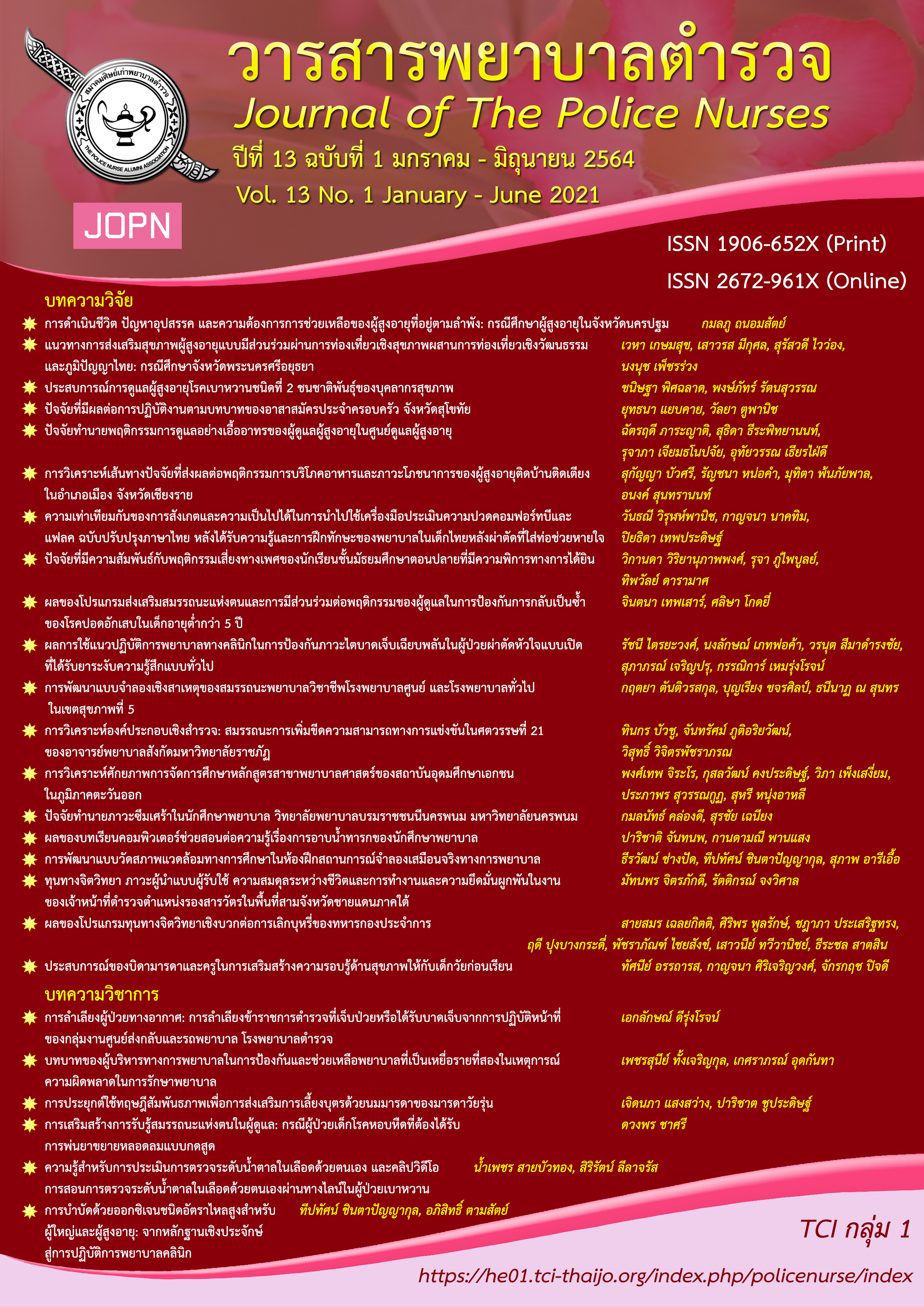EXPLORATORY FACTOR ANALYSIS: A COMPONENT OF COMPETENCY FOR IMPROVING COMPETITIVENESS IN THE 21st CENTURY OF THE RAJABHAT UNIVERSITY’S NURSING INSTRUCTORS
Keywords:
competency for improving competitiveness, 21st century, nursing instructorAbstract
The purpose of this research was to explore factors for improving competitiveness in the 21st century of Rajabhat university’s nursing instructors by using exploratory factor analysis (EFA). One hundred fifty-two 152 members from twelve faculties of nursing in Rajabhat University were identified as a stratified random sample. Five Likert-scale questionnaires were used as a research instrument. Validity analysis by Index of Item Objective Congruence was between .57 to 1.00 and the alpha coefficient reliability was .986. The data were analyzed by an Exploratory Factor Analysis to extract the components by principal component analysis and varimax orthogonal method.
The purpose of this research was to explore factors for improving competitiveness in the 21st century of Rajabhat university’s nursing instructors by using exploratory factor analysis (EFA). One hundred fifty-two 152 members from twelve faculties of nursing in Rajabhat University were identified as a stratified random sample. Five Likert-scale questionnaires were used as a research instrument. Validity analysis by Index of Item Objective Congruence was between .57 to 1.00 and the alpha coefficient reliability was .986. The data were analyzed by an Exploratory Factor Analysis to extract the components by principal component analysis and varimax orthogonal method.
The results of revealed 8 components improving competitiveness in the 21st century competency, which are 1) professional leadership, 2) research and innovation, 3) multicultural, 4) clinical practice, 5) ethics and code of conduct 6) learning management 7) curriculum and digital technology and 8) teamwork. In particular, 69.97 percent of all components could explain the factors that improve competitiveness in the 21st century.
Downloads
References
Berghout, T. (2021). How are nurse educators prepared to teach interprofessional practice? Nurse Education Today, 98(104745), 1-5.
Buachu, T. (2018). A study of the opinion of teaching and learning models of undergraduate nursing curriculum, Phetchaburi Rajabhat university in the 21st century. Journal of Nursing Science Chulalongkorn University, 30(3), 26-37.
Buachu, T., Sirirat, N., & Muangkaew, P. (2020). The scenario of nursing curriculum in the next decade (A.D. 2020-2029), Rajabhat university in Thailand. Journal of The Police Nurses, 12(2), 301-310.
Choocheep, K. (2019). Equation 3 CS: Competency, commitment, contribution. OCSC e-Journal, 61(4), 10-12.
Chooha, U., Somchoe, P., Naksukhum, S., Poungsamai, P., Prayoonsirisak, R., & Mongkolsawad, J. (2019). How to produce nursing to meet the needs of graduate user in the 21st century : Challenges of Thai nursing instructors. Mahasarakham Hospital Journal, 16(2), 176-186.
Hair, J., Anderson, R., Tatham, R., & Black, W. (1998) Multivariate data analysis (5th ed.). New Jersey, NJ.: Prentice Hall.
Halstead, J. (2018). NLN core competencies for nurse educators: A decade of influence. Philadelphia, PA: Wolters Kluwer.
Jindarak, P. (2017). Competency development for academic staff in high education. Journal of Graduate Studies Valaya Alongkorn Rajabhat University, 11(1), 221-233.
Letourneau, D., Goudreau, J., & Cara, C. (2021). Humanistic caring, a nursing competency: Modelling a metamorphosis from students to accomplished nurses. Scandinavian Journal of Caring Sciences, 35,196-207.
Nes, A. A. G., Steindal, S. A., Larsen, M. H., Heer, H. C., Laerum-Onsager, E., & Gjevjon, E. R. (2021). Technological literacy in nursing education: A scoping review. Journal of Professional Nursing, 37(2), 320-334.
Office of the Education Council. (2017). National education plan (A.D. 2017-2036). Bangkok: Prigwhan Graphic Co., Ltd.
Roongruangsri, S., & Sngounsiiritham, U. (2015). Nursing faculty: Challenging the personal competency. Nursing Journal, 42(Supplement), 214-221.
Salminen, L., Tuukkanen, M., Clever, K., Fuster, P., Kelly, M., Kielé, V., . . . PROCOMPNurse-Consortium. (2021). The competence of nurse educators and graduating nurse students. Nurse Education Today, 98(104769), 1-6.
Saraketrin, A., Rongmuang, D., & Chantra, R. (2019). Nursing education in the 21st century: Competencies and roles of nursing instructors. Journal of The Royal Thai Army Nurses, 20(1), 12-20.
Somsap, Y., & Varee, A. (2019). Thai nurse brand in 21st century: Challenges for nursing profession. Songklanagarind Journal of Nursing, 39(3), 169-178.
Srisatidnarakul, B. (2010). The methodology in nursing research. Bangkok: U&I Inter Media.
Thongkalya, B. (2020). The challenge of human resource management. OCSC e-Journal, 62(1), 3-8.
Tosunoz, I. K., Yikar, S. K., Cercer, Z., Kara, P., Arslan, S., & Nazik, E. (2021). Perceptions of interdisciplinary education and readiness for inter-professional education of nursing students: A sample of three different cities in Turkey. Nurse Education Today, 97(104673), 1-6.
Vandermause, R., Fish, A. F., Bender, A., Kuensting, L., Murphy, N., & Lavin, R. (2021). The “seeing place”: Teaching nurse Practitioners about cultural difference through dramatization. Nurse Education Today, 97(104689), 1-6.
World Health Organization. (2016). Nurse educator core competencies. Geneva: The WHO Document Production Services.
Zlatonovic, T., Havnes, A., & Mausethagen, S. (2017). A research review of nurse teachers’ competencies. Vocations and Learning, 10, 201-233.
Downloads
Published
How to Cite
Issue
Section
License
ผลงานที่ได้ตีพิมพ์แล้วจะเป็นลิขสิทธิ์ของวารสารพยาบาลตำรวจ
















